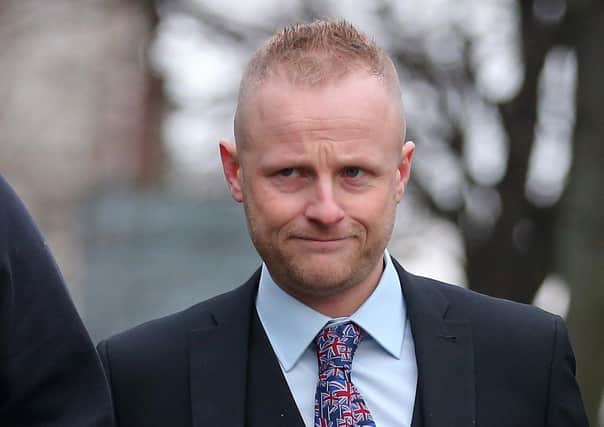Jamie Bryson wins permission to challenge NAMA prosecution


He was granted leave to seek a judicial review of the decision to return him for trial on a charge of conspiracy to commit misconduct in public office.
Former Sinn Fein MLA Daithi McKay and party member Thomas O’Hara are accused of the same offence in relation to Mr Bryson’s evidence at a Stormont inquiry into the sale of the National Asset Management Agency (Nama)’s Northern Ireland property portfolio.
Advertisement
Hide AdAdvertisement
Hide AdWith Mr McKay already taking legal action over the three men being committed for trial, senior judges ruled yesterday that the high-profile loyalist has also established arguable points.
The Lady Chief Justice, Dame Siobhan Keegan, confirmed: “We are going to grant leave in relation to the Bryson case and have the two cases together.”
Both challenges were listed for a full, two-day hearing in November.
In 2015 Mr Bryson, 31, gave evidence to Stormont’s finance committee – then chaired by Mr McKay – as part of its examination of the Project Eagle deal to sell Nama’s Northern Ireland property portfolio to US investment giant Cerberus.
Advertisement
Hide AdAdvertisement
Hide AdA decision was later taken to prosecute Mr McKay, of Loughan Road in Dunnamanagh, Co Tyrone; Mr Bryson, of Rosepark in Donaghadee, Co Down; and Mr O’Hara, from Lisnahunshin Road in Cullybackey, Co Antrim.
It centres on an alleged conspiracy to subvert the finance committee’s proceedings by giving evidence that should not have been permitted in open session.
Mr McKay has since stood down as an MLA for North Antrim and quit the party.
Earlier this year he secured leave to apply for a judicial review of the decision to send him for Crown Court trial.
Advertisement
Hide AdAdvertisement
Hide AdMr Bryson’s barrister, John Larkin QC, argued that his challenge involved similar grounds as well as issues specific to him.
“It’s a case of real substance,” Mr Larkin contended.
“It seems obvious that the two cases should be heard together.”
Backing those submissions, Dame Siobhan held that Mr Bryson’s legal action should also be allowed to proceed “on the basis that an arguable case has been determined in the McKay case, and all matters can be canvassed at a full hearing”.